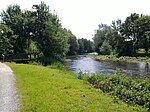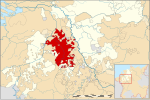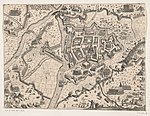The siege of Jülich was a major operation in the second phase of the Eighty Years' War that took place from 5 September 1621 to 3 February 1622. A few months after the Twelve Years' Truce between the Dutch Republic and the Spanish Monarchy expired, the Spanish Army of Flanders, led by the Genoese nobleman Ambrogio Spinola, went on the offensive against the Republic and approached the Rhine river to mask its true intentions: laying siege to the town of Jülich, which the Dutch States Army had occupied in 1610 during the War of the Jülich Succession. Although the capture of the town would not allow for a Spanish invasion of the Republic, its location between the Rhine and Meuse rivers rendered it strategically significant for both sides, given that the United Provinces greatly benefited from the river trade with the neighboring neutral states and Spain was pursuing a strategy of blockading the waterways which flowed across the Republic to ruin its economy.
The siege operations were undertaken by a relatively small force under Count Hendrik van den Bergh, a Catholic cousin of Prince Maurice of Orange, while the Spanish main army under Spinola took positions along the neighboring Duchy of Cleves to prevent the States Army under Maurice to relieve Jülich. Located far away from the Dutch border, the town had strong defenses and was well garrisoned by a force under Frederik Pithan. Spinola therefore ordered a blockade to starve the defenders while they were submitted to regular bombardments. Pithan launched several sorties over the siege works, but they achieved little. An attempt by Maurice to sneak some troops across the Spanish lines also failed. In January 1622, the defenders, decimated by hunger and cold, surrendered to Van den Bergh.
During 1622 and 1623, the Spanish Army completely evicted the Dutch troops from the rest of the Duchy of Jülich, as well as from the towns and castles that they held in Westphalia. Though the river blockade was ultimately unsuccessful, Jülich remained in Spanish control until 1660, and the Catholic victory was celebrated by artworks commissioned by the Spanish Crown and the Spinola family. Additionally, it was reported while it was ongoing by the fledgling press of the Northern and Southern Netherlands.










